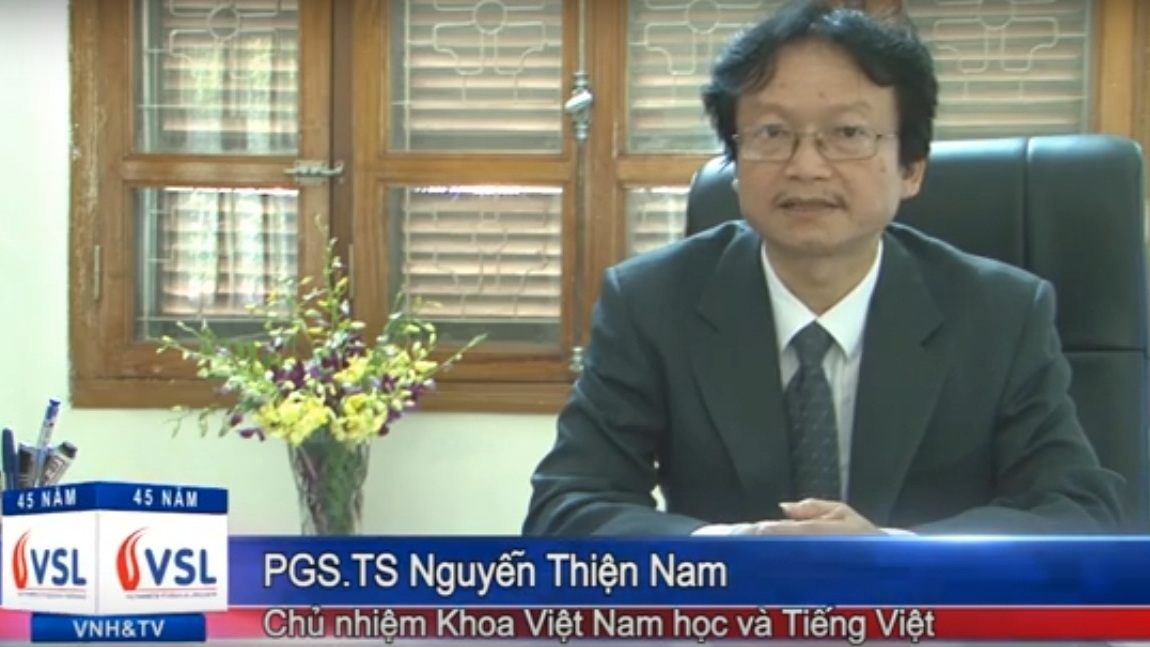 |
| Associate Professor Nguyen Thien Nam |
Associate Professor works to bring Vietnamese language to foreigners
As
the Dean of the Faculty of Vietnamese Studies and Language under the
University of Social Sciences and Humanities (USSH), Associate Prof, Dr
Nguyen Thien Nam has spent 36 years of his career promoting Vietnamese
language to the world. In this interview below, Dr Nam will share his
vivid memories about teaching Vietnamese language during his teaching
career.
Vietnam Net Bridge | 19 February 2017
Can you please share with us your most memorable memory
during your 36 years working as a bridge bringing Vietnamese language to
the world?
I spent most of my springtime in Cambodia, this was a tough but memorial period of time.
On
those days, in order to help Cambodian friends rebuild their country,
which was seriously damaged by the Pol Pot genocidal regime, we needed
to develop a common channel of dialogue using Vietnamese and Khmer
languages.
Most of the teachers working at the Vietnamese Language Faculty of the USSH were encouraged to get involved in the work.
We
not only came to Cambodia to teach Vietnamese but also opened training
courses for foreign language teachers at foreign language universities
in Hanoi as well as soldiers, who then went on to work in Cambodia.
The overall success of restructuring Cambodia was contributed to by our Vietnamese language teachers.
What
are the differences of the training programme on Vietnamese studies at
your faculty with training programmes in foreign countries?
Meanwhile, in our faculty, Vietnamese studies are open for both Vietnamese and foreign students.
This is an inter-sectional subject that provides background knowledge on Vietnamese language, history, literature and culture.
We
are currently hosting hundreds of international students from over 30
countries around the world and more than 250 Vietnamese students who are
completing their Master’s or PhD degrees.
Teaching
Vietnamese language is a way of contributing to preserving the country’s
sprit. Can you share with us one of your touching stories during your
teaching career?
Every job needs a passion, and my passion has been nurtured from very real stories.
Our
faculty has welcomed thousands of students from around the world who
came here for Bachelor decrees or short training courses.
Although
they left, their stories have still remained. One of our French
students, whose father is Vietnamese and mother is Chinese, returned to
his father’s home country to study his native language when he was 60.
We also received two students, a father and son from the Netherlands - the son and husband of a Vietnamese woman.
Another story is about 17 year-old James Engel, the maternal grandchild of a Dutch diplomat.
Although
James has acquired six languages, he decided to come to Vietnam to
learn his seventh and gain a Master’s degree in Vietnamese Studies.
I also met a Vietnamese man who married a Russian woman and then came to the USA for work.
He brought his wife and their three children back to Vietnam so that they could learn Vietnamese.
Our
faculty has seen many interesting stories about the love for Vietnamese
language, the aspiration to learn about the beauty of the Vietnamese
language, history, land and people.
Your faculty has also hosted students who then became veteran diplomats and culturers. Can you name a few of them?
Over
the 60 years of establishment, our faculty has trained thousands of
foreigners and hundreds of veteran diplomats, 15 of them have held the
positions of Ministers and Deputy Prime Ministers or have been assigned
as ambassadors of foreign countries to Vietnam, such as China, Laos,
Cambodia, Romania, Bulgaria, Mongolia, the UK, Palestine and the
Democratic People's Republic of Korea.
They still keep in mind their days studying in our faculty. Romanian Ambassador to Vietnam A.
Valeriou
shared his memory about war time when people heard the sirens wailing,
they would have to escape into air raid shelters.
Meanwhile,
Palestinian Ambassador S. Salama still remembered a tough period of time
during his study when every party was celebrated with only a few
biscuits and pieces of candy.
There is an increasing
demand for learning Vietnamese language and culture among foreigners in
Vietnam as well as Vietnamese communities abroad. What do you think are
the basic requirements for training centres and teachers for Vietnamese
language?
I am proud of the language capacity of those who have received training in our faculty meets the standard requirement.
To
be good at teaching Vietnamese, you have to meet the requirements of
obtaining a good teaching method, sound knowledge on Vietnamese language
and other cultures.
But first and foremost, you have to love Vietnamese language and maintain the habit of using the language.
Thank you so much for the interview!
Nhan Dan


No comments:
Post a Comment